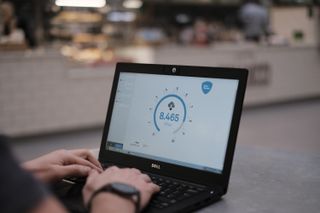Virgin Media trials 8Gbps fibre to futureproof network
Speeds achieved without new cable deployment

Virgin Media says it can achieve home broadband speeds of up to 8Gbps using its existing infrastructure following a successful trial of Ethernet Passive Optical Network (EPON) technology in Cambridgeshire.
The cable operator says it believes it is essential to futureproof its network against future demand from customers and to maintain its speed leadership in the UK.
Although a number of service providers are now investing in fibre to the premise (FTTP) networks, Virgin Media’s cable network has historically offered faster speeds than what its rivals can provide, while it has frequently rolled out upgrades to customers.
- See all of today's best fibre broadband deals
Virgin Media 8Gbps
This latest trial in Papworth, venue of previous Virgin Media technical trials, saw selected residents able to access symmetrical 8Gbps speeds and give the company the ability to see how the service would behave in a real-life setting.
“We’re delighted with the success of the trial,” Richard Sinclair, executive director of connectivity at Virgin Media, tells TechRadar Pro. “It’s a bit like being a Formula One team: while we’re speeding around the race track, we’re learning a lot about how the speeds are being used.”
Sinclair is keen to emphasise that these speeds have been achieved without the need to deploy new cables and that it is only equipment at the customer end that has changed. EPON has traditionally been used to deliver speeds of 1Gbps but new equipment from partner ARRIS has helped to increase this transmission rate.
To independently verify the speeds, Virgin Media worked with Ofcom’s technical partner SamKnows which fast tracked the development of a multi-gigabit speed testing tool. Although, Virgin Media has no plans to roll out the new speeds more widely in the immediate future, it believes it will be better placed to do so when the time comes.
Are you a pro? Subscribe to our newsletter
Sign up to the TechRadar Pro newsletter to get all the top news, opinion, features and guidance your business needs to succeed!
“[In this trial] We’ve worked with our equipment suppliers, engineers, procurement, backroom stuff. A lot of things that will hopefully be boring to our customers,” adds Sinclair.
“My philosophy is trial, trial and trial again. That feedback is already flowing back into the process to ensure we optimise the quality of our services. The best new of the trial is we’ve been able to deliver those speeds using our existing infrastructure.
“With the volume of our customers’ internet usage almost doubling every year, trials like this will ensure we have the capability to meet the demand of data-hungry services in the future – be that over cable or full fibre.”

Changing demand
The faster speeds have obvious benefits when it comes to streaming and downloading 4K content or video games, but Sinclair says Virgin Media has to be ready for future use cases and changing demand.
Households are connected more devices to the network, applications are becoming more data intensive, and demographic trends such as adults house sharing are all having an impact. The reliability of the network is also important, especially when it comes to things like connected CCTV cameras.
Sinclair accepts that some of this can be solved through better consumer equipment, such as routers equipped with Wi-Fi 6 or are able to prioritise essential traffic, but that this can only be achieved if the speed going into the home is sufficient.
The move has already been hailed as an important step forward by Virgin Media as it looks to stay one step ahead of the competition.
"The time to deployment is impressive which underlines what can be done with the existing infrastructure," Paolo Pescatore, an independent telecoms analyst, told TechRadar Pro.
"[It’s] a key move in driving costs down and improving network efficiencies.”
"Moving forward we will see all providers focus on network expansion, offering faster speeds, and improving in home connectivity."
Futurologist Tom Cheesewright added that any measures to artificially constrain use will stifle innovation and that it is only by giving people access to the network that a new generation of applications will emerge.
“We’re seeing use cases that we never would have thought of,” agrees Sinclair. “It’s about giving people a superior network and allowing customers how to innovate or not.”
- Here are the best Virgin Media broadband deals for February 2019
Steve McCaskill is TechRadar Pro's resident mobile industry expert, covering all aspects of the UK and global news, from operators to service providers and everything in between. He is a former editor of Silicon UK and journalist with over a decade's experience in the technology industry, writing about technology, in particular, telecoms, mobile and sports tech, sports, video games and media.
